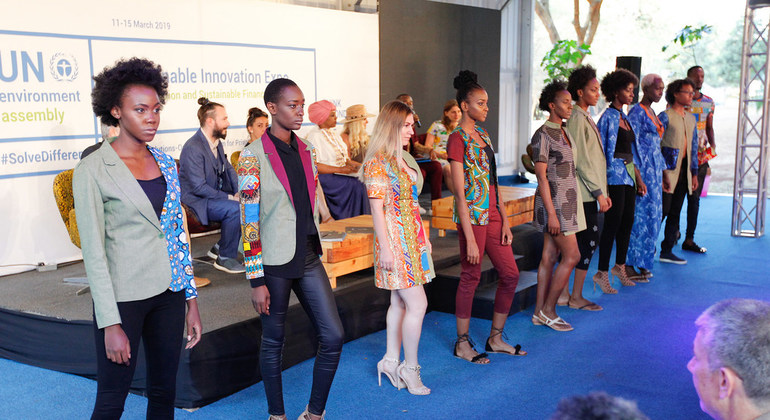When we think of industries that are having a harmful effect on the environment, manufacturing, energy, transport and even food production might come to mind. But the fashion industry is considered by the UN Conference on Trade and Development (UNCTAD), to be the second most polluting industry in the world.
According to UNCTAD, some 93 billion cubic metres of water – enough to meet the needs of five million people – is used by the fashion industry annually, and around half a million tons of microfibre, which is the equivalent of 3 million barrels of oil, is now being dumped into the ocean every year.
As for carbon emissions, the industry is responsible for more than all international flights and maritime shipping combined.
The dominant business model in the sector is that of “fast fashion”, whereby consumers are offered constantly changing collections at low prices, and encouraged to frequently buy and discard clothes. Many experts, including the UN, believe the trend is responsible for a plethora of negative social, economic and environmental impacts and, with clothing production doubling between 2000 and 2014, it is crucially important to ensure that clothes are produced as ethically and sustainably as possible.
Innovating for sustainability
Despite the grim statistics, producers and consumers of fashion are increasingly waking up to the idea that the industry needs to change. A number of companies, including large volume retailers, are integrating sustainability principles into their business strategies. Examples include the global clothing chain H&M, which has a garment collection scheme; jeans manufacturer Guess, which is involved in a wardrobe recycling programme; and outdoor clothing company Patagonia, which produces jackets using polyester from recycled bottles.
Smaller companies are also helping change the environmental landscape of fashion and building sustainability into their whole business model.
Among them are the Swiss firm Freitag, which upcycles truck tarpaulins, seat belts and seat belts to make bags and backpacks; Indosole, which makes shoes from discarded tyres; and Novel Supply, a Canadian clothing business, which has a “take-back scheme,” whereby customers can return their clothes when they are no longer wearable, so that the company can reuse and recycle them.
The founder of Novel Supply, Kaya Dorey,, won a Young Champions of the Earth award, the UN’s highest environmental honour, in recognition of her attempts to create a production model that involves using environmentally-friendly materials, and finding solutions for waste created during the manufacturing process.
In this video she explains how every element of her company’s production process is geared towards minimising waste and damage to the environment.
The UN’s role in cleaning up the fashion industry
If we carry on with a business-as-usual approach, the greenhouse gas emissions from the industry are expected to rise by almost 50% by 2030 Elisa Tonda, Head of the Consumption and Production Unit at UN Environment
In a bid to halt the fashion industry’s environmentally and socially destructive practices, and harness the catwalk as a driver to improve the world’s ecosystems, 10 different United Nations organizations established the UN Alliance on Sustainable Fashion, launched during the 2019 UN Environment Assembly, which took place in Nairobi in March.
Elisa Tonda, Head of the Consumption and Production Unit at UN Environment (UNEP), one of the 10 UN bodies involved in the Alliance, explained the urgency behind its formation: “The global production of clothing and footwear generates 8% of the world’s greenhouse gas emissions and, with manufacturing concentrated in Asia, the industry is mainly reliant on hard coal and natural gas to generate electricity and heat. If we carry on with a business-as-usual approach, the greenhouse gas emissions from the industry are expected to rise by almost 50% by 2030.”
The power of influencers
British artist and environmental activist Elle L was one of the speakers at the launch, and she told UN News that she agrees that fast-fashion was the biggest obstacle to sustainability: “there’s a real pressure to buy, and there are no brake pads to slow over-production and over-consumption. We need better labelling, so that people know what they’re buying; a tax or a ban on synthetic fibres which are causing serious environmental damage and contributing to a micro-plastics crisis; and a shift in mindset regarding over-production and over-consumption.”



